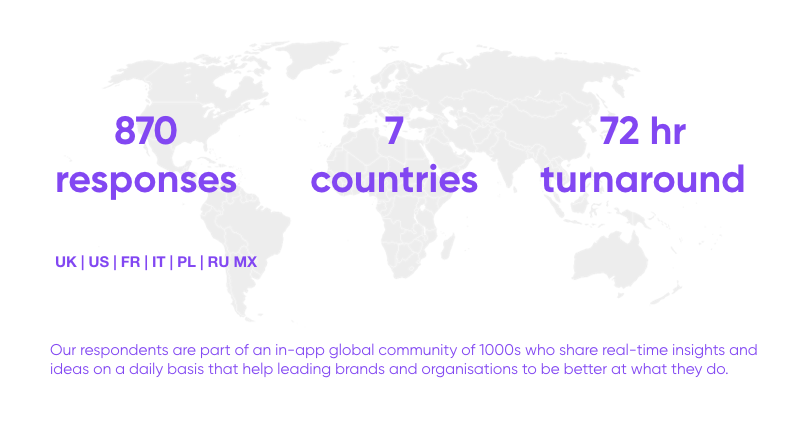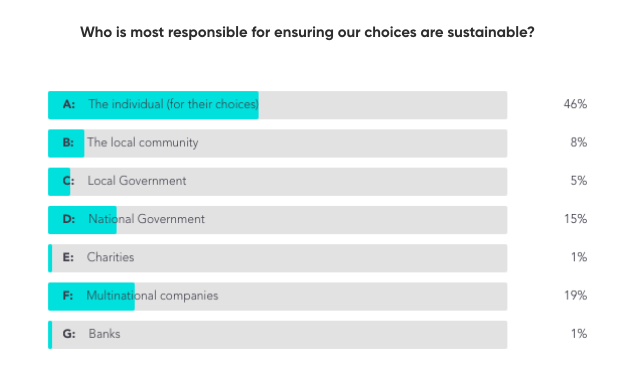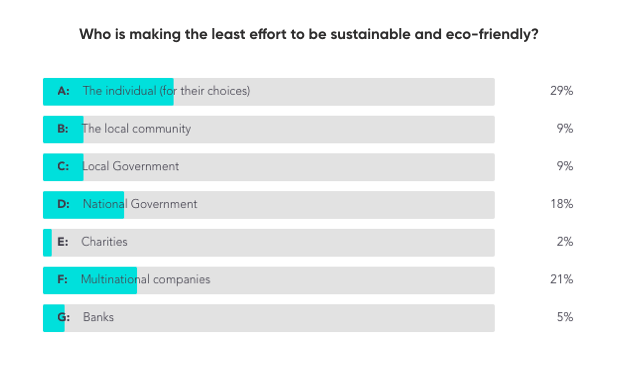When it comes to recycling, our Bulbsharers are passionate and committed, but all too often they are left frustrated, annoyed and above all, let down by brands.
Our community wants to recycle, and usually does – but when they don’t, it is principally due to issues around packaging, such as unclear messaging and overly complicated rules. What we are seeing is a community that feels frustrated by brands and supermarkets – tellingly, 19% of Bulbsharers say it is ‘multi-national companies’ who are most responsible for our choices being sustainable (second on our list, behind ‘the individual’), but 21% say these companies are making the ‘least effort’ to help (again, second on our list). These people are crying out for a global brand to lead the way on recycling, with clear messaging around the issue, innovative packaging solutions, and a joined-up campaign that involves supermarkets and governments.
We asked 870 Bulbsharers users across seven different countries to talk about their issues and challenges when it comes to recycling. Here’s what they had to say…

Who is to blame?
The main enemies seem to be supermarkets, global food brands and Governments. Our respondents feel like they are doing all the hard work – sorting, rinsing, deciphering complex numbering systems (plastics) – while being preached to by institutions who aren’t really helping.
Our community is trying to recycle as much as they can, and 64% of them said the way they shop for food and drink is one of the key areas where they are trying to make change. They want to shop more sustainably and feel brands can either hamper or drive this. They are looking for products with sustainable packaging and brands with strong, authentic stories that communicate tangible actions they are actually doing.
When asked who is most responsible for ensuring our choices are sustainable, 21% of Bulbsharers said ‘multinational companies’ – with this choice coming a clear second behind ‘the individual’. And when asked what is stopping them from being truly sustainable, 60% mentioned products or packaging.

Confusion is rife
Have you heard of the number system for recycling plastic? Do you understand it? If you’re anything like the 870 Bulbshare users who answered our survey, it’s probably left you confused. The number is a “resin identification code, used to help recycling plants sort materials. Recyclable plastics are labelled with numbers 1-7 to tell workers what kind of plastic it is, and how it should be processed.”
The main plastics that are accepted for recycling are types 1 and 2 – which most ‘hard plastic’ containers fall into. But feedback from our users tell us that people are generally confused by the system, don’t know which plastics they can recycle and which they can’t, and end up lumping them all together. Did you know, for instance, that plastic bags are increasingly being accepted by recyclers and can be returned to many stores for recycling? Neither did most of our Bulbshare community.
“There’s so much confusion around plastic packaging – what can be recycled and what can’t. Often, it doesn’t tell you and you have to guess.” (Bulbshare user)
“What we need is a more awareness around the numbers system so people actually know how it works and what to do…” (Bulbshare user)
What emerges from our survey is a widely felt frustration at a lack of joined-up thinking between governments and supermarkets and brands (packagers) who have failed to come up with clear messaging, educational campaigns or easy-to-follow instructions on packaging. When asked who is making the least effort to be sustainable, ‘multi-national companies’ came second on our list of options, behind ‘the individual’.

What does our community want?
Our community wants recycling – especially plastic – to be simplified, with supermarkets and big FMCG brands leading the way…
“Companies can use all the plastic they want then put it on (us) to recycle. And there’s no clear messaging. It’s very confusing.” (Bulbshare user)
Our community cites challenger brands like Grove who have an eco-friendly refilling programme for their cleaning products and Reel who make tree-free bamboo toilet paper and donate reusable toilets to African communities for every roll they sell.
They also tell us about cosmetics brands such as Lush and The Body Shop who are innovating around sustainability, and clothing manufacturers like H&M, Zara and Patagonia who are leading the way with recycled materials and garment recycling programmes. These brands are clear with their messaging, have simple, sustainable processes and communicate them well. When it comes to their strategy and messaging around recycling, our Bulbsharers tell us that big brands could learn a lot from how the smaller brands are doing things.
Just as major global FMCG giants must learn from these smaller ‘green’ brands, supermarkets need to look to the multitude of independent refill and re-use food shops that are increasingly popping up in local communities. While these zero-waste shops began as a comparatively esoteric ‘movement’, used only by sustainability extremists, they are increasingly moving into the mainstream consciousness and mentioned more and more by our Bulbshare community.
The overriding message from our community is that the recycling process needs to be simplified and that brands, supermarkets and governments must lead the way – with joined up thinking leading to clearer messaging, raised awareness and a better process.
Key take-outs
- Innovate around packaging, process and campaigns: Our community wants brands and supermarkets to come together to formulate and promote new campaigns and packaging solutions that take the confusion out of recycling.
- Be authentic and show your working: Modern consumers are savvy, and they’re sceptical of brands that cash in on sustainability buzzwords, without taking any real action. They want brands to mean it. And it’s not just about packaging. Our community say they want brands to be transparent about their manufacturing processes, from the electricity they use to how they treat their workers.
- Be a leader: The message is clear. Our community wants to live and shop sustainably, but they can’t do it without brands leading the way. They expect change, and the brands that demonstrate commitment and action, are the ones that will gain market share.

This will be indeed a welcomed development. Recycling helps fo give the environments green
agree
Great article
Geri dönüşüm çoğalmalı bütün mağazalar geri dönüşümünü desteklemeli biz de onları desteklemeliyiz doğaya sahip çıkalım
Sin duda el reciclaje impactará, favorablemente al medio ambiente, si a esto se suman empresas comprometidas y ciudadanía igualmente participativa para la transformación.